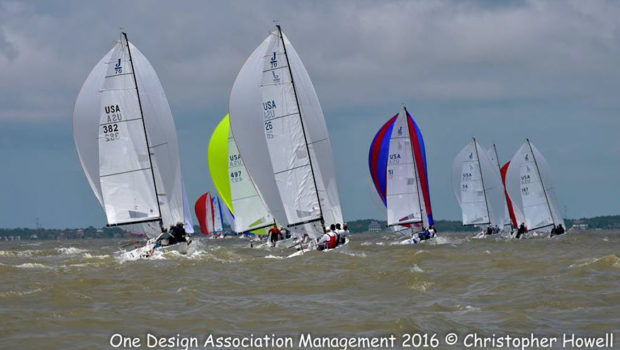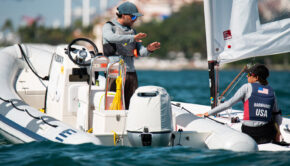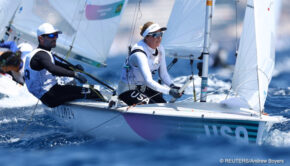Limit Professionalism to Protect the Fleet
Published on June 20th, 2016
One design class racing is typically the domain for those sailors that embrace community and fellowship as much as competition. However, the investment needed to remain competitive in certain classes is now disrupting the tenets of this sector of the sport.
At the 2016 J/70 North Americans, only a quarter of the fleet sailed without professional sailors, as defined by the International Sailor Classification Code. The top ranked amateur team finished 11th. The next team finished mid-fleet in 22nd.
Jack Franco, who won the Corinthian title, shares his perspective on the situation…
As the skipper that finished 11th at the J70 North Americans, I appear to be in the minority that can compete at the front of the fleet without professional help. But our team is made up of longtime friends that, many years ago, were college All-Americans and National Champions in various classes. So for us, competing against the best sailors in the world is what we know, and what we want.
But the landscape sure has changed.
When I got out of high school, I sailed boats I couldn’t afford to campaign much less own. But I begged and borrowed equipment, living in fear I might break something I couldn’t afford to replace. I slept in cars and on friend’s floors, and the relationships I made during those years are still with me and I cherish every memory.
The racing was in established one design classes where this mix between young and old sailors flourished. I was the young hotshot on a shoestring budget competing against the older more established sailors who could afford better equipment but were also juggling work and family life. Our mutual limitations leveled the playing field, and we all seemed to benefit from our differences.
It was a good blend where a lot of ‘weekend warrior’ teams had a chance to win big events. The only professionals were the sailmakers, and while they often trophied, even they had limits on the number of days they could be away from the business.
However, much of this has disappeared over the years and I miss sitting around the campfire with a cold beer talking about how to go a little faster with people who freely shared their information. Today the top teams may arrive at events weeks in advance, and their ‘recreational’ sailing programs have a level of sophistication I could not have imagined 25 years ago.
The drawback of this current reality is that we have removed the casual mid-fleeters from those classes that have a lot of cache and sizzle, grow quickly, but shrivel and die just a fast. These people are often the life-blood of a class, the volunteers that keep the engine running.
Those boat owners that once brought along friends and club juniors as crew, often giving them a leg up in the life ladder outside of sailing, are now employers that hire people to sail with them. These are now result-oriented relationships that change when performance suffers.
I look back at the people I sailed with and against, people such as Jerry Thompson, Dave Ullman, Ted Hinshaw, Marty Lockney, Argyle Campbell and Ed Cummins. They all added to my sailing, but more importantly, they taught me life skills. A few even gave me my early jobs to start my career after school.
With less folks at events around the globe, we are developing an entire generation of NASCAR race teams and not sailors as I remember. It has become my sailing organization against yours and not just folks going sailing. This will diminish our sport over the long haul, offering a playing field for only the wealthy boat owner and the full-time sailing professional.
As I climb down from my soapbox, and accepting that the genie won’t go back in the bottle, I have two suggestions if class organizations want to address this situation.
For starters, I want to sail against the pros, I would likely leave the class if they were banned, and I would never attend a “Corinthian Only” event. What I suggest is to limit professional paid crew to one per boat on the water and remove all coaching from event locations. This compromise allows almost any group to have the ability to have a good race (the life blood of the middle group of all class participants) through a combination of practice and preparation.
When I see projects where a boat owner has multiple boats, 3 to 6 pro sailors and an entire team of paid hands doing boat work and the like, all so they can go out and beat the daylights out of a bunch of folks sailing with their friends and family, I cringe. Simply stated, it’s not the way to grow our sport nor build a class organization for the long haul.









 We’ll keep your information safe.
We’ll keep your information safe.